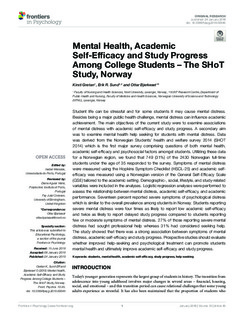| dc.contributor.author | Grøtan, Kirsti | |
| dc.contributor.author | Sund, Erik | |
| dc.contributor.author | Bjerkeset, Ottar | |
| dc.date.accessioned | 2019-09-30T07:57:06Z | |
| dc.date.available | 2019-09-30T07:57:06Z | |
| dc.date.created | 2019-07-02T12:39:09Z | |
| dc.date.issued | 2019 | |
| dc.identifier.citation | Frontiers in Psychology. 2019, 10 1-11. | nb_NO |
| dc.identifier.issn | 1664-1078 | |
| dc.identifier.uri | http://hdl.handle.net/11250/2619283 | |
| dc.description.abstract | Student life can be stressful and for some students it may cause mental distress. Besides being a major public health challenge, mental distress can influence academic achievement. The main objectives of the current study were to examine associations of mental distress with academic self-efficacy and study progress. A secondary aim was to examine mental health help seeking for students with mental distress. Data was derived from the Norwegian Students’ health and welfare survey 2014 (SHOT 2014) which is the first major survey comprising questions of both mental health, academic self-efficacy and psychosocial factors amongst students. Utilizing these data for a Norwegian region, we found that 749 (31%) of the 2430 Norwegian full-time students under the age of 35 responded to the survey. Symptoms of mental distress were measured using the Hopkins Symptom Checklist (HSCL-25) and academic self-efficacy was measured using a Norwegian version of the General Self-Efficacy Scale (GSE) tailored to the academic setting. Demographic-, social, lifestyle, and study-related variables were included in the analyses. Logistic regression analyses were performed to assess the relationship between mental distress, academic self-efficacy, and academic performance. Seventeen percent reported severe symptoms of psychological distress which is similar to the overall prevalence among students in Norway. Students reporting severe mental distress were four times as likely to report low academic self-efficacy and twice as likely to report delayed study progress compared to students reporting few or moderate symptoms of mental distress. 27% of those reporting severe mental distress had sought professional help whereas 31% had considered seeking help. The study showed that there was a strong association between symptoms of mental distress, academic self-efficacy and study progress. Prospective studies should evaluate whether improved help-seeking and psychological treatment can promote students mental health and ultimately improve academic self-efficacy and study progress. | nb_NO |
| dc.language.iso | eng | nb_NO |
| dc.publisher | Frontiers Media | nb_NO |
| dc.rights | Navngivelse 4.0 Internasjonal | * |
| dc.rights.uri | http://creativecommons.org/licenses/by/4.0/deed.no | * |
| dc.title | Mental health, academic self-efficacy and study progress among college students - The SHoT study, Norway | nb_NO |
| dc.type | Journal article | nb_NO |
| dc.type | Peer reviewed | nb_NO |
| dc.description.version | publishedVersion | nb_NO |
| dc.source.pagenumber | 1-11 | nb_NO |
| dc.source.volume | 10 | nb_NO |
| dc.source.journal | Frontiers in Psychology | nb_NO |
| dc.identifier.doi | 10.3389/fpsyg.2019.00045 | |
| dc.identifier.cristin | 1709333 | |
| dc.description.localcode | Copyright © 2019 Grøtan, Sund and Bjerkeset. This is an open-access article distributed under the terms of the Creative Commons Attribution License (CC BY). The use, distribution or reproduction in other forums is permitted, provided the original author(s) and the copyright owner(s) are credited and that the original publication in this journal is cited, in accordance with accepted academic practice. No use, distribution or reproduction is permitted which does not comply with these terms. | nb_NO |
| cristin.unitcode | 194,65,20,15 | |
| cristin.unitname | Helseundersøkelsen i Nord-Trøndelag | |
| cristin.ispublished | true | |
| cristin.fulltext | original | |
| cristin.qualitycode | 2 | |

